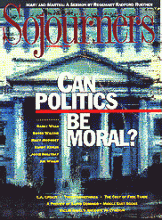Exactly four months after the fires of the Los Angeles rebellion seared their way through the national consciousness, The L.A. Times (9/3/92) reported that "normalcy" had returned:
Sharply contradicting the popular assumption that the 1992 riots were a "wake-up call" for Los Angeles, a UCLA survey has found that the cataclysmic events of this spring did very little to alter residents' attitudes about economic, ethnic, political and social life....In the aftermath of the most destructive civil disturbance in the United States in this century, the survey found county residents had no renewed commitment to addressing poverty, racial inequality or prejudice.
Indeed, media fascination has moved on to other apocalypses (the devastation of Hurricane Andrew, starvation in Somalia). As the dreaded "long, hot summer" yields to autumn, politicians have ceased to seek photo ops in "the heart of South Central," and national organizations are no longer sending delegations to "understand what happened in LA."
While many agree that LA is the future tense of urban America, few wish to pay attention long enough to engage the structural issues that led to what social critic Mike Davis calls the first great "post-modern bread riot." Nevertheless, a variety of reconstruction and reparation battles by local community activists have begun to map the new political terrain facing all those struggling for inner-city justice.
Read the Full Article

